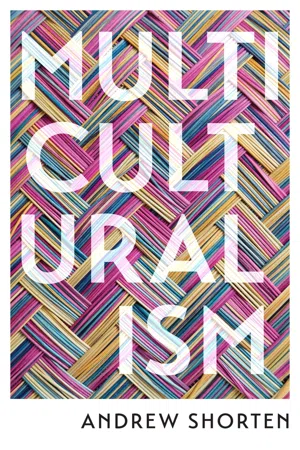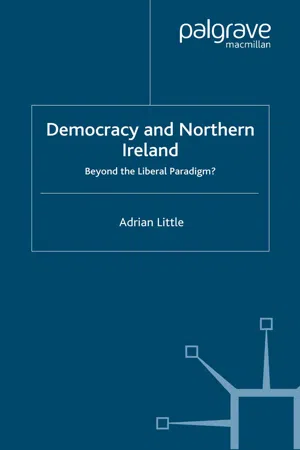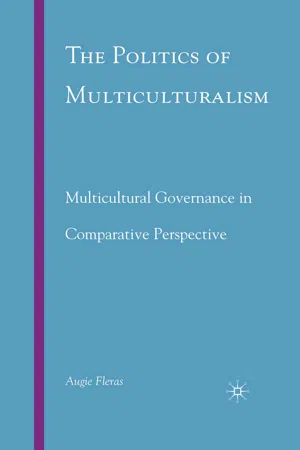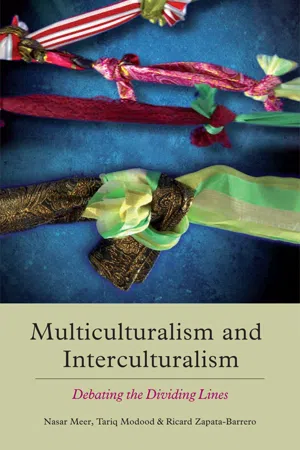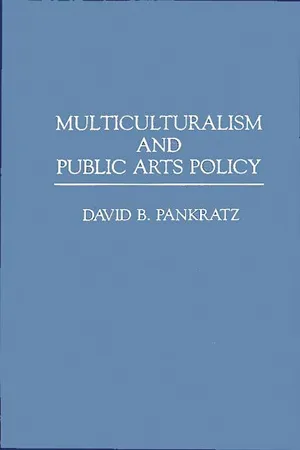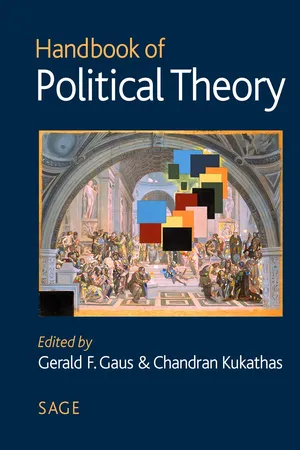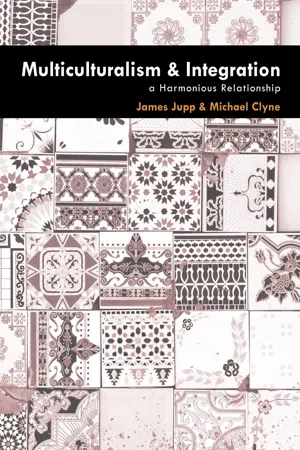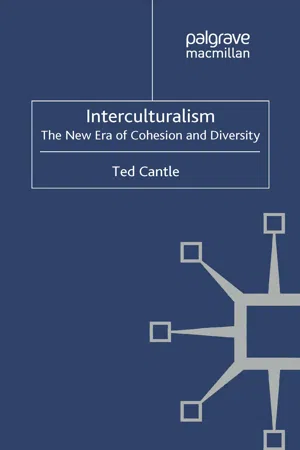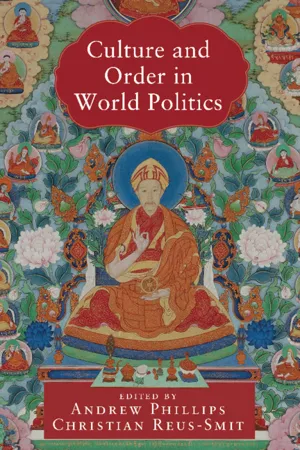Politics & International Relations
Multiculturalism
Multiculturalism refers to the coexistence of diverse cultural groups within a society, promoting the recognition and acceptance of different cultural identities. It emphasizes the value of cultural diversity and aims to create an inclusive environment where individuals from various backgrounds can live harmoniously. Multiculturalism often involves policies and practices that support equality, tolerance, and respect for different cultural traditions.
Written by Perlego with AI-assistance
Related key terms
1 of 5
10 Key excerpts on "Multiculturalism"
- eBook - PDF
Multiculturalism
The Political Theory of Diversity Today
- Andrew Shorten(Author)
- 2022(Publication Date)
- Polity(Publisher)
In this case, and in others too, multicultural ideas will need to be complemented with additional theoretical resources. In recent years, there has been something of a backlash against Multiculturalism, both in the comparatively calm waters of academic political theory and in the stormier ones of real-world politics. Rumours of Multiculturalism’s demise, however, have been exaggerated. One reason for this is that some key claims associated with multicultur- alism have become so firmly established that it is difficult to imagine them being dislodged. For example, in most democratic societies it is no longer controversial that national minorities are entitled to some form of recognition, that the implementation of public policies should be responsive to differences of language and religion, and that minority religious beliefs and practices should sometimes be accom- modated. Of course, the form that recognition, responsiveness and accommodation should take is disputed, but these are issues about how to do Multiculturalism, and not about whether it should be done at all. Furthermore, some of the supposed alternatives to multicultur- alism, such as policies to promote social cohesion or the emergence of a new agenda of interculturalism, take up themes and ideas already present in multicultural political theory, and are better understood as being continuous with Multiculturalism rather than being opposed to or in conflict with it. In the remainder of this introduction, and before setting out the plan of the book ahead, I will attempt to define, at least in very general terms, what Multiculturalism is, and to set out some of the main political claims associated with it. Introduction 3 What is Multiculturalism? Multiculturalism is a slippery term, not least because it is used both descriptively, to signify the presence of more than one culture, and normatively, to refer to a theory about how political communities should deal with differences of culture and identity. - eBook - PDF
Democracy and Northern Ireland
Beyond the Liberal Paradigm?
- A. Little(Author)
- 2004(Publication Date)
- Palgrave Macmillan(Publisher)
3 Multiculturalism and the Politics of Difference One of the primary accusations levelled at the kind of universalism that underpins political liberalism is that it is ‘difference-blind’. This criticism takes many different forms but is often associated with feminists (Young 1990) and leftist communitarians (Taylor 1992). 1 However, in recent years it has also been clear that many theorists within the liberal tradition like Kymlicka, Kukathas and Raz have also been concerned with the capacity of liberalism to provide the mechan- isms that allow diverse societies to cohere, whilst still remaining true to such values as freedom, equality, toleration and diversity. More recently still, the debate over liberalism and social diversity has been clarified in the literature over the political implications of multicultur- alism. The two key contributions to this debate have been the re- working of multicultural politics by Bhikhu Parekh (2000) and the refutation of these arguments from a universalist liberal perspective by Barry (2001). This chapter will examine the applicability of these theor- ies to the political situation in Northern Ireland and assess the value of Multiculturalism to the rethinking of democracy there. At the outset it may be useful to ground our discussion in a working definition of Multiculturalism and here the work of Matthew Festenstein is instructive. He describes the politics of Multiculturalism as concerned with ‘the way in which cultural and ethnic differenti- ation may be accommodated in social, political and economic arrange- ments’ and, in particular, his focus is on ‘the sphere of evaluative or normative inquiry into how the politics of culturally plural societies ought to be conducted’ (Festenstein 2000: 70). It is clear how such a model might be seen as relevant to politics in Northern Ireland given the social divisions that prevail there and the way that discussions of those divisions are frequently presented in cultural or ethnic terms. - eBook - PDF
The Politics of Multiculturalism
Multicultural Governance in Comparative Perspective
- A. Fleras(Author)
- 2015(Publication Date)
- Palgrave Macmillan(Publisher)
9 The Politics of Multicultural Politics: Transatlantic Divides, Intercontinental Discourses Introduction: This (Mis)Adventure Called Multiculturalism O ne of the more vexing shibboleths of the twenty-first century is the much-trumpeted death knell of Multiculturalism. In the security- conscious era following 9/11 and 7/7, the politics over Multiculturalism have leapt into prominence, with some saying “yes,” others insisting on “no,” and still others, a “maybe” (reflecting a combination of igno- rance, confusion, or indifference). Pundits of varying political stripes have declared that, in outlasting its usefulness, Multiculturalism is dying or in retreat, in part because of the encounter with the Islamic “other” (Hage 2006; IMISCOE 2006; Modood 2008). And good riddance too, according to critics. To one side of the dismissive divide are the perceived excesses associated with campus speech codes, compulsory sensitivity training, the expunging of dead white male authors from course curricula, and ruined careers because of frivolous “ism” charges (Bernstein 1994). To the other side are those who criticize Multiculturalism as a thinly veiled hegemony for consolidating prevailing patterns of power and privilege (Bannerji 2000; Thobani 2007). To yet another side are the risks asso- ciated with careless multicultural policies, including the proliferation of tribally inspired identity politics and unbounded collective rights, whose cumulative impact results in a splintered society of monocultural ghet- tos (“cultural apartheid”) (Alibhai-Brown 2000; Malik 2008). Thankfully, critics conclude, a yearning for national solidarity and a singularity of cit- izenship has discredited this misadventure called Multiculturalism, while reviving a more monocultural normalcy (Wirten 2008). 188 THE POLITICS OF Multiculturalism But there is a major exception to this anti-Multiculturalism movement: Canada. - eBook - PDF
Political Concepts
A Reader and Guide
- Iain MacKenzie(Author)
- 2005(Publication Date)
- Edinburgh University Press(Publisher)
4 Multiculturalism Paul Graham Introduction The term ‘Multiculturalism’ has gained wide currency in both academic and popular debate, and its employment is not restricted to political theory or political science: there are multicultural perspectives not only in other social sciences, but also in the humanities, and even in the natural sciences. For this reason it is important to demarcate the debate within political theory. If we say that what makes politics possible is, on the one side, conflict, and on the other, the possibility of co-operation, then Multiculturalism is concerned with the possibility of political co-operation in the face of cultural conflict: can a given set of political institutions or principles be defended from a diverse range of cultural perspectives? If not, can we conceive of alternative institutions which would be defensible? And it is important to recognise that political theory isn’t concerned merely with what political principles should be operative in society, but also with how those principles are justified . Therefore, the legitimacy of political principles turns not on what is empirically accepted, but on the reasons which could be given for accepting them. Following John Rawls, we assume a ‘closed society’, not in the sense that people cannot leave it, but rather that the possibility of emigration cannot be taken as evidence that those who ‘choose’ not to emigrate have ‘tacitly consented’ to the existing political order. Further, we assume that political principles will be enforced by an entity which, as Max Weber defined it, ‘claims to command a monopoly on the legitimate use of coercion in a particular territory’. Given the assumption of a closed society, whose members are subject to coercive authority, we can refine what is at 240 - eBook - PDF
Multiculturalism and Interculturalism
Debating the Dividing Lines
- Ricard Zapata-Barrero, Nasar Meer, Tariq Modood, Nasar Meer, Tariq Modood, Ricard Zapata-Barrero(Authors)
- 2016(Publication Date)
- Edinburgh University Press(Publisher)
I want to suggest, on the contrary, that the politics of rhetoric in this field is itself very interesting and revealing. Interculturalism as political myth Consider, in this regard, the influential 2008 White Paper on Intercultural Dialogue from the Committee of Ministers of the Council of Europe (COE 2008). It argues that interculturalism should be the preferred model for Europe because Multiculturalism has failed: In what became the western part of a divided post-war Europe, the experience of immigration was associated with a new concept of social order known as Multiculturalism. This advocated political recognition of what was perceived as the distinct ethos of minority communities on a par with the ‘host’ majority. While this was ostensibly a radical departure from assimilationism, in fact Multiculturalism frequently shared the same, schematic conception of society set in opposition of 3 This chapter is a revised and expanded version of my ‘Comment on Meer and Modood’, Journal of Interculturalism Studies , 33 (2012), 211–16. will kymlicka 160 majority and minority, differing only in endorsing separation of the minority from the majority rather than assimilation to it . . . Whilst driven by benign intentions, Multiculturalism is now seen by many as having fostered communal segregation and mutual incomprehen-sion, as well as having contributed to the undermining of the rights of individuals – and, in particular, women – within minority communities, perceived as if these were single collective actors. The cultural diversity of contemporary societies has to be acknowledged as an empirical fact. However, a recurrent theme of the consultation was that multicultural-ism was a policy with which respondents no longer felt at ease. - eBook - PDF
- David Pankratz(Author)
- 1993(Publication Date)
- Praeger(Publisher)
And as Daniel Bell has argued, the modern efficacy of ethnicity rests on the combination of economic and pohtical interests with the "affective ties" of cultural identity as a basis for social and pohtical action, a force far more potent than class. 34 It is time to bring these strands together in a descriptive definition of multiculturahsm. But first, a couple of final points. The discussion to this point has, to some degree, foreshadowed my conclusion that a descriptive definition of Multiculturalism must include premises underlying concepts of both culture and ethnicity. This conclusion is warranted, I believe, because contemporary conceptions of ethnicity, with their stress on pohtical and economic structures, flesh out the premise in the definition of culture referring to political, economic, and social policy. Further, new conceptions of ethnicity seem to stress, as mentioned above, biological characteristics such as race. Thus, a definition of Multiculturalism that stresses characteristics and conditions of racial minorities within a social system could be said to be descriptive, in that it would reflect and summa- rize previous usage. But it must be admitted that some would object to the focus on racial minorities in a definition of Multiculturalism, in that such a focus would neglect other points of reference for the term, including the ethnicity of white Americans as well as group memberships based on age, sex, sexual preference, and physical capability, among others. Thus, those who would extend the term Multiculturalism to cover these points of reference would likely argue that a definition of multiculturahsm that stresses racial minorities, at the very least, is a stipulative definition, an attempt to lay down conditions for usage of the term within a certain context. - eBook - PDF
- Gerald F Gaus, Chandran Kukathas, Gerald F Gaus, Chandran Kukathas(Authors)
- 2004(Publication Date)
- SAGE Publications Ltd(Publisher)
For this reason, it may be necessary for the state to take an interest in the fostering of a sense of citizenship and belonging. This, however, brings us back to the problems with which our discussion began. The desire of each to be recognized as different and distinctive gives rise to a demand for a politics of Multiculturalism – one that recognizes and tolerates, or even encourages and honours, diversity. Yet the politics of diversity in turn may give rise to a demand for political separa-tion, and the emergence of communities in which diversity has no place. How the many can live as one remains a salient question in political theory. REFERENCES Anderson, Benedict (1993) Imagined Communities: Reflections on the Origin and Spread of Nationalism . New York: Verso. Arneson, Richard and Ian Shapiro (1996) ‘Democratic autonomy and religious freedom: a critique of Wisconsin v. Yoder ’. In Ian Shapiro and Russell Hardin, eds, Political Order : NOMOS XXXVIII . New York: New York University Press, 365–411. Auster, Lawrence (1992) ‘The forbidden topic: the link between Multiculturalism and immigration’. National Review , 27 (April). Barry, Brian (1991) ‘Self-government revisited’. Democracy and Power . Oxford: Clarendon, 156–86. Barry, Brian (2001) Culture and Equality: An Egalitarian Critique of Multiculturalism . Oxford: Polity. Baumeister, Andrea T. (2000) Liberalism and the ‘Politics of Difference’ . Edinburgh: Edinburgh University Press. Benhabib, Seyla (2002) The Claims of Culture: Equality and Diversity in the Global Era . Princeton, NJ: Princeton University Press. Beran, Harry (1984) ‘A liberal theory of secession’. Political Studies , 32: 21–31. Beran, Harry (1987) The Consent Theory of Political Obligation . London: Croom Helm. Brett, Nathan (1991) ‘Language laws and collective rights’. Canadian Journal of Law and Jurisprudence , 4: 347–60. Brimelow, Peter (1995) Alien Nation: Common Sense about America’s Immigration Disaster . - eBook - PDF
Multiculturalism and Integration
A Harmonious Relationship
- Michael Clyne, James Jupp, Michael Clyne, James Jupp(Authors)
- 2011(Publication Date)
- ANU Press(Publisher)
‘Multiculturalism’ lacks the rhetorical resonance of the ‘melting pot’ for nation-building purposes. I stress that the difficulty, here, is more rhetorical than substantive. Multiculturalism is, indeed, concerned with integrating a diverse society based on liberal democratic notions of liberty, equality and justice. Nevertheless, it is the case that many Australians are unable to warm to the term. As the National Multicultural Advisory Council 45 reported, pollster ‘[Irving] Saulwick’s research identified a strong desire for unity in this country. He showed that the concept of Multiculturalism raised in many minds an emphasis on separateness rather than togetherness’. By the mid 1990s, even one of the architects of Australian multicultural policy was calling for the term to be dropped, although he continued to support the policies for which it stands 46 . And, of course, the Howard government removed the word from official use in early 2007, a move that has largely been preserved by the Rudd government. For all these reasons, it makes more sense to construe Multiculturalism as a set of principles, policies and programs in the service of an Australian national identity than as the locus of that identity itself. 42 Anderson, Benedict (1983). Imagined Communities: Reflections on the Origin and Spread of Nationalism . Verso, London. 43 Wingo, Ajume (2003). Veil Politics in Liberal Democratic States. Cambridge University Press, Cambridge: 126. 44 Hirst, John (2001): 31. 45 National Multicultural Advisory Council (NMAC) (1999). Op cit : 96. 46 Zubrzycki, Jerzy (1996), ‘Cynics woo the ethnic vote’. The Australian 15 October. Chapter 4: Multicultural Integration in Political Theory 81 This brings us to the intermediate position of ‘liberal nationalists’. Their ‘thin’ account of national identity acknowledges both the legitimate national interests of liberal democracies and the need to make room for cultural minorities. - T. Cantle(Author)
- 2012(Publication Date)
- Palgrave Macmillan(Publisher)
8 Interculturalism: Policy and Practice Much of the previous discussion points to the need for fundamental change and for the development of new ways in which we can learn to live together in an increasingly interconnected and interdependent world. Each society is of course different and the policies and practices of interculturalism need to reflect this. However, there are a number of common themes that would appear to offer a progressive and forward- looking agenda for change. Moreover, a successful transition to a new approach will depend upon the emergence of an international con- sensus, though this could build upon the work already undertaken by the Council of Europe, the British Council, the Comedia Group and others. Leadership and vision It almost goes without saying that the success of a new model of interculturalism – or any perspective about how we live together with others – will depend upon the development of a vision of a shared world and society in which people are encouraged to value the common humanity of all nations, faiths and ethnic groups. As discussed earlier, such a vision has only briefly flickered in the past and was perhaps at its strongest following the horror of the Second World War. Political leaders were then keen to emphasise the need to avoid future conflicts and to heal wounds and divisions, pledging to build trust and under- standing and replace the bitter enmity of the past. And it has proved successful with peace in Europe at least for the longest ever period. Col- laboration can soon give way to conflict, however, when the vision is dimmed over time and there are signs of new divisions emerging, partly as a consequence of globalisation, which will threaten the future peace. 176 Interculturalism: Policy and Practice 177 Some see the divisions within and between nations as a natural phe- nomenon, borne out of man’s innate competitiveness and tribalism.- eBook - PDF
- Andrew Phillips, Christian Reus-Smit(Authors)
- 2020(Publication Date)
- Cambridge University Press(Publisher)
UN-style multicultural- ism conceives of the state as the possession of all citizens, not of a national majority or a powerful ethno-racial or religious faction. 18 Liberal Multiculturalism supports some collectivist norms and institutions, such as human rights and protections for subjugated groups like Indigenous peoples. The professed purpose is to enhance democratic citizenship. Group membership is foundational and minority group rights are essen- tial, although both are secondary to ‘universally recognized human rights and fundamental freedoms,’ as specified in the UN Universal Declar- ation on Cultural Diversity. 19 For adherents, the multicultural accom- modation of difference is far superior to a paradigm that ideologically reifies ethno-racial hierarchy and champions white, Western superiority. The United Nations’ diversity regime of liberal Multiculturalism extends to sustainability. Indeed, the United Nations frames sustainable development as a globally minded antidote to the problems of local urban growth: all too often haphazard, environmentally destructive, socially regressive, and driven foremost by short-term profit motives. 20 Furthermore, the United Nations calls for the simultaneous consideration and regulation of cultural, social, economic, and environmental issues. Recently, in 2015, the organization announced its 2030 Agenda for Sus- tainable Development (the successor to UN Agenda 21) with goals that include ‘gender equality,’ ‘reduced inequalities,’ and ‘sustainable cities and communities’ that are ‘inclusive, safe, resilient.’ 21 (Despite such endorsements, the states that dominate global governance all prioritize security, geopolitics, and short-term economic growth over a coherent ideology of liberal Multiculturalism, minority empowerment, or environ- mental protection.) 22 The parochial anti-globalism of the anti-Agenda 21 campaign pushes back against post-Cold War liberal internationalism.
Index pages curate the most relevant extracts from our library of academic textbooks. They’ve been created using an in-house natural language model (NLM), each adding context and meaning to key research topics.
